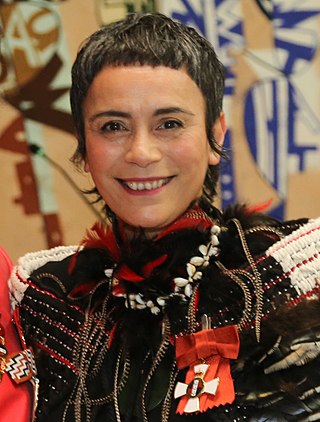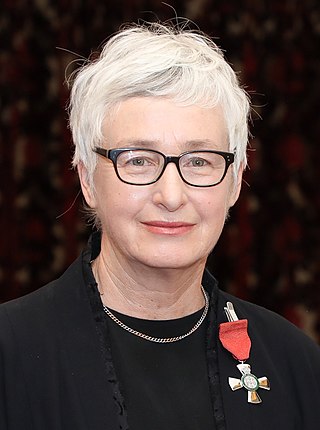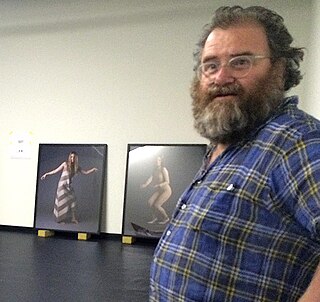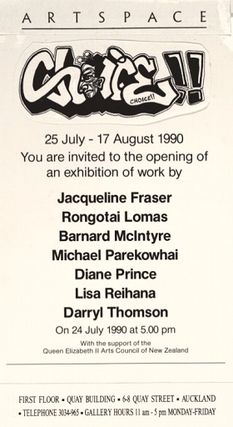Related Research Articles

Vincent Ward is a New Zealand film director, screenwriter and artist.

Leonard Charles Huia Lye was a New Zealand artist known primarily for his experimental films and kinetic sculpture. His films are held in archives including the New Zealand Film Archive, British Film Institute, Museum of Modern Art in New York City, and the Pacific Film Archive at University of California, Berkeley. Lye's sculptures are found in the collections of the Whitney Museum of American Art, the Art Institute of Chicago, the Albright-Knox Art Gallery and the Berkeley Art Museum. Although he became a naturalized citizen of the United States in 1950, much of his work went to New Zealand after his death, where it is housed at the Govett-Brewster Art Gallery in New Plymouth.

Andrew Drummond is a New Zealand painter and sculptor. He attended University of Waterloo in Canada, graduating in 1976. He was a Frances Hodgkins Fellow in 1980.

Billy Apple was a New Zealand artist whose work is associated with the London, Auckland and New York schools of pop art in the 1960s and NY's Conceptual Art movement in the 1970s. He worked alongside artists like Andy Warhol and David Hockney before opening the second of the seven New York Not-for-Profit spaces in 1969. His work is held in the permanent collections of Tate Britain, Scottish National Gallery of Modern Art, Philadelphia Museum of Art, Guggenheim Museum, Chrysler Museum of Art, Detroit Institute of Arts, National Gallery of Australia, Te Papa, Auckland Art Gallery, the Christchurch Art Gallery, the University of Auckland, and the Stedelijk Museum voor Actuele Kunst in Belgium.
Dame Cheryll Beatrice Sotheran was a New Zealand museum professional. She was the founding chief executive of the Museum of New Zealand Te Papa Tongarewa and was credited with the successful completion of the museum, considered the largest international museum project of the 1990s.

The Govett-Brewster Art Gallery is a contemporary art museum at New Plymouth, Taranaki, New Zealand. The gallery receives core funding from the New Plymouth District Council. Govett-Brewster is recognised internationally for contemporary art.

Wystan Tremayne Le Cren Curnow is a New Zealand art critic, poet, academic, arts administrator, and independent curator. He is the son of Elizabeth Curnow, a painter and printmaker, and poet Allen Curnow.

Lisa Marie Reihana is a New Zealand artist. Her video work, In Pursuit of Venus [Infected] (2015), which examines early encounters between Polynesians and European explorers, was featured at the 2017 Venice Biennale.

Christina Joy Barton, known as Tina Barton, is a New Zealand art historian, curator, art writer and editor. She was director of the Adam Art Gallery between 2007 and 2023.

Rhana Jean Devenport is an Australian-born art curator and museum professional. She was director of the Auckland Art Gallery from 2013 to 2018, after which she became director of the Art Gallery of South Australia in Adelaide. She has announced that she will be moving to Sydney at the end of her contract on 7 July 2024.
Fiona Mary Clark is a New Zealand social documentary photographer, one of the first photographers to document New Zealand's LGBT scene. In the 1970s and 1980s she photographed Karangahape Road, and the clubs Mojo's, Las Vegas Club and the KG Club.
Merylyn Tweedie is a multi-media artist from New Zealand. In 2004 she won the Walters Prize, New Zealand's largest contemporary art prize, and in 2003 her work was selected to represent New Zealand at the Venice Biennale.

Luise Fong is a Malaysian-born New Zealand artist.
Roger John Horrocks is a New Zealand writer, film-maker, educator and cultural activist.
Darcy Bruce Espie Lange was a New Zealand artist born in Urenui. Lange studied at the Elam School of Fine Arts (1964–1967) creating hard-edge abstract sculptures before studying at the Royal College of Art in London and shifting his focus to moving image and photography.
Denise Kum is a New Zealand artist. Her works are held in the collection of Auckland Art Gallery Toi o Tāmaki, Museum of New Zealand Te Papa Tongarewa, and the University of Auckland art collection.

Robert Leonard is a New Zealand art curator, writer, and publisher.

Choice! was a ‘game-changing’ exhibition of contemporary Māori art curated by George Hubbard and exhibited in the Auckland gallery Artspace from 25 July to 17 August 1990.
Ronald Norris O'Reilly was a librarian who promoted and exhibited contemporary New Zealand art. He served as Christchurch city librarian from 1951 to 1968, and director of the Govett-Brewster Art Gallery from 1975 to 1979.
Raymond Wallace Thorburn was a New Zealand artist, art educator and museum director.
References
- ↑ "John Maynard: biography" . Retrieved 18 January 2024.
- ↑ Garcia, Dennis (17 November 2016). "Fifty Years Ago: John Maynard Comes to Gbag". Taranaki Daily News.
- ↑ Winder, Virginia (26 January 2018). "The Life and Times of the Unstoppable Architect Terry Boon". Taranaki Daily Herald. Retrieved 3 May 2023.
- ↑ "Ruth Buchanan: The Actual and it's Document". Archived from the original on 3 August 2018. Retrieved 3 May 2023.
- ↑ "The Rise of Post-Object Art" . Retrieved 3 May 2023.
- ↑ "Real Time: a Light and Sound Environment". YouTube . Retrieved 3 May 2023.
- ↑ "The Footstep Man". IMDb . Retrieved 17 May 2023.
- ↑ Curnow, Wystan (1975). "Project Programmes" (PDF). Auckland Art Gallery Quarterly (75–76): 15.
- ↑ Lethbridge, John. "Formal Enema Enigma" (PDF). Retrieved 3 May 2023.
- ↑ "Exhibition History" (PDF).
- ↑ "Pan Pacific Biennale Archive" . Retrieved 3 May 2023.
- ↑ "First Pan Pacific Biennale Catalogue" (PDF). Retrieved 3 May 2023.
- ↑ "The World of Len Lye". Archived from the original on 6 December 2021. Retrieved 3 May 2023.
- ↑ "Phase Three Film Production Ltd" . Retrieved 3 May 2023.
- ↑ "Our Films" . Retrieved 3 May 2023.
- ↑ "Feature Film" . Retrieved 3 May 2023.
- ↑ "About Face" . Retrieved 3 May 2023.
- ↑ "Study Guide for Vigil" (PDF). 1984. Retrieved 3 May 2023.
- ↑ "Vincent Ward" . Retrieved 3 May 2023.
- ↑ "Australian Screen The Navigator etc" . Retrieved 3 May 2023.
- ↑ Noonan, Michael (3 April 1992). "The Gamut of NZ Film". Financial Review. Retrieved 3 May 2023.
- ↑ "An Angel at my Table". IMDb . Retrieved 3 May 2023.
- ↑ "Footprint Films" . Retrieved 3 May 2023.
- ↑ Shelton, Lindsay (2005). The Selling of New Zealand Movies. Awa Press.
- ↑ "Felix Media Pty Ltd" . Retrieved 3 May 2023.
- ↑ Brannigan, Genevieve (28 May 2019). "Venice Biennale: Artist Angelica Mesiti examines architecture of democracy for Australian Pavilion". Design Review.
- ↑ "Strata". IMDb . Retrieved 15 May 2023.
- ↑ "All Men are Liars". IMDb . Retrieved 15 May 2023.
- ↑ "The Bank". IMDb . Retrieved 15 May 2023.
- ↑ "John Maynard". IMDb . Retrieved 15 May 2023.
- ↑ "John Maynard: Biography" . Retrieved 3 May 2023.
- ↑ Barton, Christina; Bywater, Jonathan; Curnow, Wystan; Telford, Helen; Govett-Brewster Art Gallery (2016). Now showing : a history of the Govett-Brewster Art Gallery. New Plymouth, Aotearoa New Zealand. ISBN 978-0-908848-74-4. OCLC 959200045.
{{cite book}}: CS1 maint: location missing publisher (link) - ↑ Pivac, Diane; Stark, Frank; McDonald, Lawrence; McAllen, Diane; Sweeney, Mark; New Zealand Film Archive (2011). New Zealand film : an illustrated history. Wellington, N.Z.: Te Papa Press. ISBN 978-1-877385-66-7. OCLC 733933840.